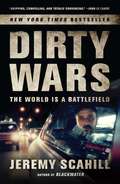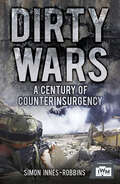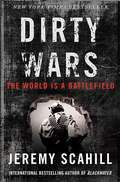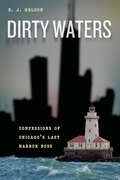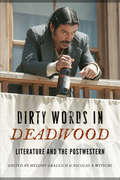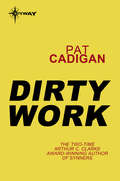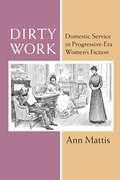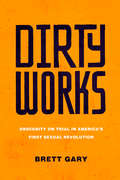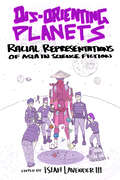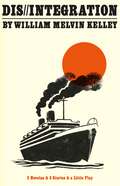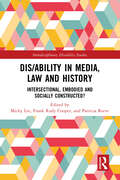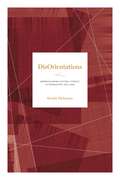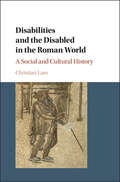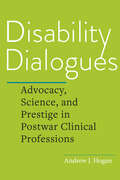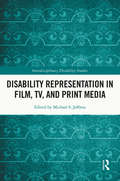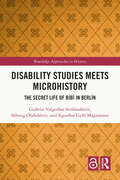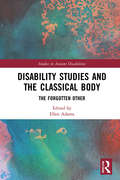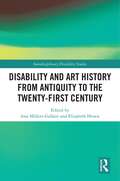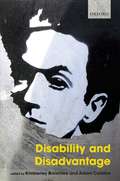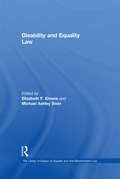- Table View
- List View
Dirty Wars
by Jeremy ScahillIn Dirty Wars, Jeremy Scahill, author of the New York Times best-seller Blackwater, takes us inside America's new covert wars. The foot soldiers in these battles operate globally and inside the United States with orders from the White House to do whatever is necessary to hunt down, capture or kill individuals designated by the president as enemies.Drawn from the ranks of the Navy SEALs, Delta Force, former Blackwater and other private security contractors, the CIA's Special Activities Division and the Joint Special Operations Command ( JSOC), these elite soldiers operate worldwide, with thousands of secret commandos working in more than one hundred countries. Funded through "black budgets," Special Operations Forces conduct missions in denied areas, engage in targeted killings, snatch and grab individuals and direct drone, AC-130 and cruise missile strikes. While the Bush administration deployed these ghost militias, President Barack Obama has expanded their operations and given them new scope and legitimacy.Dirty Wars follows the consequences of the declaration that "the world is a battlefield," as Scahill uncovers the most important foreign policy story of our time. From Afghanistan to Yemen, Somalia and beyond, Scahill reports from the frontlines in this high-stakes investigation and explores the depths of America's global killing machine. He goes beneath the surface of these covert wars, conducted in the shadows, outside the range of the press, without effective congressional oversight or public debate. And, based on unprecedented access, Scahill tells the chilling story of an American citizen marked for assassination by his own government.As US leaders draw the country deeper into conflicts across the globe, setting the world stage for enormous destabilization and blowback, Americans are not only at greater risk-we are changing as a nation. Scahill unmasks the shadow warriors who prosecute these secret wars and puts a human face on the casualties of unaccountable violence that is now official policy: victims of night raids, secret prisons, cruise missile attacks and drone strikes, and whole classes of people branded as "suspected militants." Through his brave reporting, Scahill exposes the true nature of the dirty wars the United States government struggles to keep hidden.
Dirty Wars
by Jeremy ScahillThis enhanced edition for Apple tablets features over thirty images, including film stills from the Oscar-nominated documentary Dirty Wars, as well as exclusive photographs of Scahill’s reporting in Yemen and Somalia. This edition also features interactive color maps, as well as seven short videos that include the film trailer, clips from the film, and interviews with Scahill. In the video interviews, Scahill shares his insights on the history of drones, President Obama’s hawkish foreign policies, and the killing of Anwar al-Awlaki. In Dirty Wars, Jeremy Scahill, author of the New York Times best-seller Blackwater, takes us inside America’s new covert wars. The foot soldiers in these battles operate globally and inside the United States with orders from the White House to do whatever is necessary to hunt down, capture or kill individuals designated by the president as enemies. Drawn from the ranks of the Navy SEALs, Delta Force, former Blackwater and other private security contractors, the CIA’s Special Activities Division and the Joint Special Operations Command ( JSOC), these elite soldiers operate worldwide, with thousands of secret commandos working in more than one hundred countries. Funded through #147;black budgets,” Special Operations Forces conduct missions in denied areas, engage in targeted killings, snatch and grab individuals and direct drone, AC-130 and cruise missile strikes. While the Bush administration deployed these ghost militias, President Barack Obama has expanded their operations and given them new scope and legitimacy. Dirty Wars follows the consequences of the declaration that #147;the world is a battlefield,” as Scahill uncovers the most important foreign policy story of our time. From Afghanistan to Yemen, Somalia and beyond, Scahill reports from the frontlines in this high-stakes investigation and explores the depths of America’s global killing machine. He goes beneath the surface of these covert wars, conducted in the shadows, outside the range of the press, without effective congressional oversight or public debate. And, based on unprecedented access, Scahill tells the chilling story of an American citizen marked for assassination by his own government. As US leaders draw the country deeper into conflicts across the globe, setting the world stage for enormous destabilization and blowback, Americans are not only at greater risk#151;we are changing as a nation. Scahill unmasks the shadow warriors who prosecute these secret wars and puts a human face on the casualties of unaccountable violence that is now official policy: victims of night raids, secret prisons, cruise missile attacks and drone strikes, and whole classes of people branded as #147;suspected militants. ” Through his brave reporting, Scahill exposes the true nature of the dirty wars the United States government struggles to keep hidden.
Dirty Wars
by Jeremy ScahillFrom the International Bestselling author of Blackwater comes the story of AmericaOCOs global killing machine. "
Dirty Wars: A Century of Counterinsurgency
by Simon Innes-Robbins‘Who is the enemy?’ This is the question most asked in modern warfare; gone are the set-piece conventional battles of the past. Once seen as secondary to more traditional conflicts, irregular warfare (as modified and refashioned since the 1990s) now presents a major challenge to the state and the bureaucratic institutions which have dominated the twentieth century, and to the politicians and civil servants who formulate policy. Twenty-first-century conflict is dominated by counterinsurgency operations, where the enemy is almost indistinguishable from innocent civilians. Battles are gunfights in jungles, deserts and streets; winning ‘hearts and minds’ is as important as holding territory. From struggles in South Africa, the Philippines and Ireland to operations in Iraq, Afghanistan and Chechnya, this book covers the strategy and doctrine of counterinsurgency, and the factors which ensure whether such operations are successful or not. Recent ignorance of central principles and the emergence of social media, which has shifted the odds in favour of the insurgent, have too often resulted in failure, leaving governments and their security forces embedded in a hostile population, immersed in costly and dangerous nation-building.
Dirty Wars: The World Is a Battlefield
by Jeremy ScahillIn Dirty Wars, Jeremy Scahill, author of the New York Times best-seller Blackwater, takes us inside America's new covert wars. The foot soldiers in these battles operate globally and inside the United States with orders from the White House to do whatever is necessary to hunt down, capture or kill individuals designated by the president as enemies.Drawn from the ranks of the Navy SEALs, Delta Force, former Blackwater and other private security contractors, the CIA's Special Activities Division and the Joint Special Operations Command ( JSOC), these elite soldiers operate worldwide, with thousands of secret commandos working in more than one hundred countries. Funded through "black budgets," Special Operations Forces conduct missions in denied areas, engage in targeted killings, snatch and grab individuals and direct drone, AC-130 and cruise missile strikes. While the Bush administration deployed these ghost militias, President Barack Obama has expanded their operations and given them new scope and legitimacy.Dirty Wars follows the consequences of the declaration that "the world is a battlefield," as Scahill uncovers the most important foreign policy story of our time. From Afghanistan to Yemen, Somalia and beyond, Scahill reports from the frontlines in this high-stakes investigation and explores the depths of America's global killing machine. He goes beneath the surface of these covert wars, conducted in the shadows, outside the range of the press, without effective congressional oversight or public debate. And, based on unprecedented access, Scahill tells the chilling story of an American citizen marked for assassination by his own government.As US leaders draw the country deeper into conflicts across the globe, setting the world stage for enormous destabilization and blowback, Americans are not only at greater risk-we are changing as a nation. Scahill unmasks the shadow warriors who prosecute these secret wars and puts a human face on the casualties of unaccountable violence that is now official policy: victims of night raids, secret prisons, cruise missile attacks and drone strikes, and whole classes of people branded as "suspected militants." Through his brave reporting, Scahill exposes the true nature of the dirty wars the United States government struggles to keep hidden.
Dirty Wars: The World is a Battlefield
by Jeremy ScahillIn Dirty Wars, Jeremy Scahill, author of the New York Times best-seller Blackwater, takes us inside America’s new covert wars. The foot soldiers in these battles operate globally and inside the United States with orders from the White House to do whatever is necessary to hunt down, capture or kill individuals designated by the president as enemies. Drawn from the ranks of the Navy SEALs, Delta Force, former Blackwater and other private security contractors, the CIA’s Special Activities Division and the Joint Special Operations Command ( JSOC), these elite soldiers operate worldwide, with thousands of secret commandos working in more than one hundred countries. Funded through “black budgets,” Special Operations Forces conduct missions in denied areas, engage in targeted killings, snatch and grab individuals and direct drone, AC-130 and cruise missile strikes. While the Bush administration deployed these ghost militias, President Barack Obama has expanded their operations and given them new scope and legitimacy. Dirty Wars follows the consequences of the declaration that “the world is a battlefield,” as Scahill uncovers the most important foreign policy story of our time. From Afghanistan to Yemen, Somalia and beyond, Scahill reports from the frontlines in this high-stakes investigation and explores the depths of America’s global killing machine. He goes beneath the surface of these covert wars, conducted in the shadows, outside the range of the press, without effective congressional oversight or public debate. And, based on unprecedented access, Scahill tells the chilling story of an American citizen marked for assassination by his own government. As US leaders draw the country deeper into conflicts across the globe, setting the world stage for enormous destabilization and blowback, Americans are not only at greater risk—we are changing as a nation. Scahill unmasks the shadow warriors who prosecute these secret wars and puts a human face on the casualties of unaccountable violence that is now official policy: victims of night raids, secret prisons, cruise missile attacks and drone strikes, and whole classes of people branded as “suspected militants.” Through his brave reporting, Scahill exposes the true nature of the dirty wars the United States government struggles to keep hidden.
Dirty Waters: Confessions of Chicago's Last Harbor Boss
by R. J. NelsonIn 1987, the city of Chicago hired a former radical college chaplain to clean up rampant corruption on the waterfront. R. J. Nelson thought he was used to the darker side of the law--he had been followed by federal agents and wiretapped due to his antiwar stances in the sixties--but nothing could prepare him for the wretched bog that constituted the world of a Harbor Boss. Director of Harbors and Marine Services was a position so mired in corruption that its previous four directors ended up in federal prison. Nelson inherited angry constituents, prying journalists, shell-shocked employees, and a tobacco-stained office still bearing a busted door that had been smashed in by the FBI. Undeterred, Nelson made it his personal mission to become a "pneumacrat," a public servant who, for the common good, always follows the spirit--if not always the letter--of the law. Dirty Waters is a wry, no-holds-barred memoir of Nelson's time controlling some of the city's most beautiful spots while facing some of its ugliest traditions. A guide like no other, Nelson takes us through Chicago's beloved "blue spaces" and deep into the city's political morass. He reveals the different moralities underlining three mayoral administrations, from Harold Washington to Richard M. Daley, and navigates us through the gritty mechanisms of the Chicago machine. He also deciphers the sometimes insular world of boaters and their fraught relationship with their land-based neighbors. Ultimately, Dirty Waters is a tale of morality, of what it takes to be a force for good in the world and what struggles come from trying to stay ethically afloat in a sea of corruption.
Dirty Words in Deadwood: Literature and the Postwestern (Postwestern Horizons)
by Nicolas S. Witschi Melody GraulichDirty Words in &“Deadwood&” showcases literary analyses of the Deadwood television series by leading western American literary critics. Whereas previous reaction to the series has largely addressed the question of historical accuracy rather than intertextuality or literary complexity, Melody Graulich and Nicolas S. Witschi&’s edited volume brings a much-needed perspective to Deadwood&’s representation of the frontier West.As Graulich observes in her introduction: &“With its emotional coherence, compelling characterizations, compressed structural brilliance, moral ambiguity, language experiments, interpretation of the past, relevance to the present, and engagement with its literary forebears, Deadwood is an aesthetic triumph as historical fiction and, like much great literature, makes a case for the humanistic value of storytelling.&” From previously unpublished interviews with series creator David Milch to explorations of sexuality, disability, cinematic technique, and western narrative, this collection focuses on Deadwood as a series ultimately about the imagination, as a verbal and visual construct, and as a literary masterpiece that richly rewards close analysis and interpretation.
Dirty Work
by Pat CadiganDirty Work? In a manner of speaking, perhaps, but certainly not along the lines of de Sade or Henry Miller."Dirty" maybe because within this remarkable volume of short stories (a follow-up to her award-winning collection Patterns) author Pat Cadigan unflinchingly explores the implications of technology on modern and near-future societies, humorously challenges our perceptions of reality, and chillingly strips away our civilized facades to confront the bestial nature of our souls.With stories like "Home By the Sea," "Dispatches from the Revolution," "No Prisoners," "50 Ways to Improve Your Orgasm," and "Naming Names," Pat Cadigan exhibits an enviable ability to tackle a variety of themes, moods, and perspectives. And makes it all seem easy.Featuring 18 stunning fictions (including the previously unpublished "Lost Girls" written especially for this book)-as well as intriguing author introduction to each story-Dirty Work is a thought provoking, often funny, never compromising collection by one of America's most gifted authors.It doesn't get any better than this.
Dirty Work: Domestic Service in Progressive-Era Women’s Fiction (Class : Culture)
by Ann MattisDirty Work sheds light on the complex relationships between women employers and their household help in the early twentieth century through their representations in literature, including women’s magazines, conduct manuals, and particularly female-authored fiction. Domestic service brought together women from different classes, races, and ethnicities, and with it, a degree of social anxiety as upwardly mobile young women struggled to construct their identities in a changing world. The book focuses on the works of Charlotte Perkins Gilman, Edith Wharton, Gertrude Stein, Nella Larsen, Jessie Fauset, Anzia Yezierska, and Fannie Hurst and their various depictions of the maid/mistress relationship, revealing “a feminized and racialized brand of class hegemony.” Modern servants became configured as racial, hygienic, and social threats to the emergent ideal of the nuclear family, and played critical rhetorical roles in first-wave feminism and the New Negro movements. Ann Mattis reveals how U.S. domestic service was the political unconscious of cultural narratives that attempted to define modern domesticity and progressive femininity in monolithic terms.
Dirty Works: Obscenity on Trial in America’s First Sexual Revolution
by Brett GaryA rich account of 1920s to 1950s New York City, starring an eclectic mix of icons like James Joyce, Margaret Sanger, and Alfred Kinsey—all led by an unsung hero of free expression and reproductive rights: Morris L. Ernst. At the turn of the twentieth century, the United States was experiencing an awakening. Victorian-era morality was being challenged by the introduction of sexual modernism and women's rights into popular culture, the arts, and science. Set during this first sexual revolution, when civil libertarian-minded lawyers overthrew the yoke of obscenity laws, Dirty Works focuses on a series of significant courtroom cases that were all represented by the same lawyer: Morris L. Ernst. Ernst's clients included a who's who of European and American literati and sexual activists, among them Margaret Sanger, James Joyce, and Alfred Kinsey. They, along with a colorful cast of burlesque-theater owners and bookstore clerks, had run afoul of stiff obscenity laws, and became actors in Ernst's legal theater that ultimately forced the law to recognize people's right to freely consume media. In this book, Brett Gary recovers the critically neglected Ernst as the most important legal defender of literary expression and reproductive rights by the mid-twentieth century. Each chapter centers on one or more key trials from Ernst's remarkable career battling censorship and obscenity laws, using them to tell a broader story of cultural changes and conflicts around sex, morality, and free speech ideals. Dirty Works sets the stage, legally and culturally, for the sexual revolution of the 1960s and beyond. In the latter half of the century, the courts had a powerful body of precedents, many owing to Ernst's courtroom successes, that recognized adult interests in sexuality, women's needs for reproductive control, and the legitimacy of sexual inquiry. The legacy of this important, but largely unrecognized, moment in American history must be reckoned with in our contentious present, as many of the issues Ernst and his colleagues defended are still under attack eight decades later.
Dis-Orienting Planets: Racial Representations of Asia in Science Fiction
by Isiah Lavender IIIContributions by Suparno Banerjee, Cait Coker, Jeshua Enriquez, Joan Gordon, Veronica Hollinger, Malisa Kurtz, Stephanie Li, Bradford Lyau, Uppinder Mehan, Graham J. Murphy, Baryon Tensor Posadas, Amy J. Ransom, Robin Anne Reid, Haerin Shin, Stephen Hong Sohn, Takayuki Tatsumi, and Timothy J. Yamamura Isiah Lavender III's Dis-Orienting Planets amplifies critical issues surrounding the racial and ethnic dimensions of science fiction. This edited volume explores depictions of Asia and Asians in science fiction literature, film, and fandom with particular regard to China, Japan, India, and Korea. Dis-Orienting Planets highlights so-called yellow and brown peoples from the constellation of a historically white genre. The collection launches into political representations of Asian identity in science fiction's imagination, from fear of the Yellow Peril and its racist stereotypes to techno-Orientalism and the remains of a postcolonial heritage. Thus the essays, by contributors such as Takayuki Tatsumi, Veronica Hollinger, Uppinder Mehan, and Stephen Hong Sohn, reconfigure the very study of race in science fiction. A follow-up to Lavender's Black and Brown Planets, this collection expands the racial politics governing the renewed visibility of Asia in science fiction. One of the few on this subject, the volume probes Gary Shteyngart's novel Super Sad True Love Story, the acclaimed film Cloud Atlas, and Guillermo del Toro's monster film Pacific Rim, among others. Dis-Orienting Planets embarks on a wide-ranging assessment of Asian representations in science fiction, upon the determination that our visions of the future must include all people of color.
Dis//integration
by William Melvin KelleyDis//Integration, a previously unpublished work by William Melvin Kelley, author of A Different Drummer, is a notable and welcome addition to African American literature.The linked "2 novelas, 3 stories, and a little play" that make up DIS//INTEGRATION follow the life journeys of Charles "Chig" Dunford from his Nanny Eva sermonizing from her front porch, when he is only seventeen, to his peripatetic studies in Reupeo (an anagram of Europe) as a college student, to his unsettled bachelorhood as an English professor at a small Vermont college, where he continues to struggle to finish his life-long study of theReupeonese author Dupukshamin and find true love.Along the way, as Chig's sentimental education unfolds, we meet an array of memorable characters: John Hoenir, the Hemingway-esque expatriate novelist who takes Chig under his wing; Wendy Whitman, an actress passing for white, who breaks Chig's heart; Merry, his troubled teen-age niece who Chig, in middle-age, agrees to look after; Raymond Winograd, the villainous department chair; Renka Bravo, the alluring dancer who might just make Chig an honest man; and one hundred Africans mysteriously chained together in the lower decks of Chig's homeward-bound transatlantic liner.DIS//INTEGRATION is an odyssey through time in which past and future combine and re-combine to give the arc of a full life.
Dis/ability in Media, Law and History: Intersectional, Embodied AND Socially Constructed? (Interdisciplinary Disability Studies)
by Micky LeeThis book explores how being "disabled" originates in the physical world, social representations and rules, and historical power relations—the interplay of which render bodies "normal" or not. Do parking signs that represent people in wheelchairs as self-propelling influence how we view dis/ability? How do wheelchair users understand their own bodies and an environment not built for them? By asking questions like these the authors reveal how normalization has informed people’s experiences of their bodies and their fight for substantive equality. Understanding these processes requires acknowledging the tension between social construction and embodiment as well as centering the intersection of dis/abilities with other identities, such as race, class, gender, sex orientation, citizen status, and so on. Scholars and researchers will find that this book provides new avenues for thinking about dis/ability. A wider audience will find it accessible and informative.
DisOrientations: German-Turkish Cultural Contact in Translation, 1811-1946 (Max Kade Research Institute)
by Kristin DickinsonThe fields of comparative and world literature tend to have a unidirectional, Eurocentric focus, with attention to concepts of “origin” and “arrival.” DisOrientations challenges this viewpoint. Kristin Dickinson employs a unique multilingual archive of German and Turkish translated texts from the early nineteenth through the mid-twentieth century. In this analysis, she reveals the omnidirectional and transtemporal movements of translations, which, she argues, harbor the disorienting potential to reconfigure the relationships of original to translation, past to present, and West to East. Through the work of three key figures—Johann Wolfgang von Goethe, Friedrich Schrader, and Sabahattin Ali—Dickinson develops a concept of translational orientation as a mode of omnidirectional encounter. She sheds light on translations that are not bound by the terms of economic imperialism, Orientalism, or Westernization, focusing on case studies that work against the basic premises of containment and originality that undergird Orientalism’s system of discursive knowledge production. By linking literary traditions across retroactively applied periodizations, the translations examined in this book act as points of connection that produce new directionalities and open new configurations of a future German-Turkish relationship.Groundbreaking and erudite, DisOrientations examines literary translation as a complex mode of cultural, political, and linguistic orientation. This book will appeal to scholars and students of translation theory, comparative literature, Orientalism, and the history of German-Turkish cultural relations.
DisOrientations: German-Turkish Cultural Contact in Translation, 1811-1946 (Max Kade Research Institute: Germans Beyond Europe #15)
by Kristin DickinsonThe fields of comparative and world literature tend to have a unidirectional, Eurocentric focus, with attention to concepts of "origin" and "arrival." DisOrientations challenges this viewpoint. Kristin Dickinson employs a unique multilingual archive of German and Turkish translated texts from the early nineteenth through the mid-twentieth century. In this analysis, she reveals the omnidirectional and transtemporal movements of translations, which, she argues, harbor the disorienting potential to reconfigure the relationships of original to translation, past to present, and West to East. Through the work of three key figures—Johann Wolfgang von Goethe, Friedrich Schrader, and Sabahattin Ali—Dickinson develops a concept of translational orientation as a mode of omnidirectional encounter. She sheds light on translations that are not bound by the terms of economic imperialism, Orientalism, or Westernization, focusing on case studies that work against the basic premises of containment and originality that undergird Orientalism’s system of discursive knowledge production. By linking literary traditions across retroactively applied periodizations, the translations examined in this book act as points of connection that produce new directionalities and open new configurations of a future German-Turkish relationship.Groundbreaking and erudite, DisOrientations examines literary translation as a complex mode of cultural, political, and linguistic orientation. This book will appeal to scholars and students of translation theory, comparative literature, Orientalism, and the history of German-Turkish cultural relations.
Disabilities and the Disabled in the Roman World: A Social And Cultural History
by Christian LaesAlmost fifteen per cent of the world's population today experiences some form of mental or physical disability and society tries to accommodate their needs. But what was the situation in the Roman world? Was there a concept of disability? How were the disabled treated? How did they manage in their daily lives? What answers did medical doctors, philosophers and patristic writers give for their problems? <P><P>This book, the first monograph on the subject in English, explores the medical and material contexts for disability in the ancient world, and discusses the chances of survival for those who were born with a handicap. It covers the various sorts of disability: mental problems, blindness, deafness and deaf-muteness, speech impairment and mobility impairment, and includes discussions of famous instances of disability from the ancient world, such as the madness of Emperor Caligula, the stuttering of Emperor Claudius and the blindness of Homer.<P> The first scholarly study of the subject in English.<P> Comprehensively engages with literary sources, legal texts, epigraphy and papyrology, as well as with material evidence such as iconography.<P> Adopts an explicitly comparative approach which constantly seeks dialogue with new approaches and studies concerning other periods.
Disability Dialogues: Advocacy, Science, and Prestige in Postwar Clinical Professions
by Andrew J. HoganA historical look at how activists influenced the adoption of more positive, inclusive, and sociopolitical views of disability.Disability activism has fundamentally changed American society for the better—and along with it, the views and practices of many clinical professionals. After 1945, disability self-advocates and family advocates pushed for the inclusion of more positive, inclusive, and sociopolitical perspectives on disability in clinical research, training, and practice. In Disability Dialogues, Andrew J. Hogan highlights the contributions of disabled people—along with their family members and other allies—in changing clinical understandings and approaches to disability.Hogan examines the evolving medical, social, and political engagement of three postwar professions—clinical psychology, pediatrics, and genetic counseling—with disability and disability-related advocacy. Professionals in these fields historically resisted adopting a more inclusive and accepting perspective on people with disabilities primarily due to concerns about professional role, identity, and prestige. In response to the work of disability activists, however, these attitudes gradually began to change. Disability Dialogues provides an important contribution to historical, sociological, and bioethical accounts of disability and clinical professionalization. Moving beyond advocacy alone, Hogan makes the case for why present-day clinical professional fields need to better recruit and support disabled practitioners. Disabled clinicians are uniquely positioned to combine biomedical expertise with their lived experiences of disability and encourage greater tolerance for disabilities among their colleagues, students, and institutions.
Disability Representation in Film, TV, and Print Media (Interdisciplinary Disability Studies)
by Michael S. JeffressUsing sources from a wide variety of print and digital media, this book discusses the need for ample and healthy portrayals of disability and neurodiversity in the media, as the primary way that most people learn about conditions. It contains 13 newly written chapters drawing on representations of disability in popular culture from film, television, and print media in both the Global North and the Global South, including the United States, Canada, India, and Kenya. Although disability is often framed using a limited range of stereotypical tropes such as victims, supercrips, or suffering patients, this book shows how disability and neurodiversity are making their way into more mainstream media productions and publications with movies, television shows, and books featuring prominent and even lead characters with disabilities or neurodiversity. Disability Representation in Film, TV, and Print Media will be of interest to all scholars and students of disability studies, cultural studies, film studies, gender studies, and sociology more broadly.
Disability Studies Meets Microhistory: The Secret Life of Bíbí in Berlín (ISSN)
by Sigurður Gylfi Magnússon Guðrún Valgerður Stefánsdóttir Sólveig ÓlafsdóttirThis volume explores the life of Bjargey “Bíbí” Kristjánsdóttir (1927–1999), an Icelandic woman with intellectual disabilities, through analysis of her autobiography and personal archive on the basis of the research disciplines of critical disability studies and microhistory.Bíbí, who grew up in northern Iceland on a small farm called Berlin, fell ill when she was in her first year and was afterward labeled "feeble-minded" by her family and the local community. When Bíbí died, she had finished a 145,000-word autobiography which she had written alone and kept secret from her family and neighbors, very few of whom even knew that she could read and write. This book aims to consider Bíbí’s life through her autobiography and other historical sources she created, to identify how various historical, social, and cultural factors interacted and influenced her circumstances. It explores Bíbí’s agency, and how she managed to play her cards within the narrow scope given to her by society. What makes Bíbí’s history extraordinary is precisely the direct connection to her world through her counter-archive.This book provides students and scholars of the humanities and the social sciences with a new way of critical thinking about both disciplines.
Disability Studies and the Classical Body: The Forgotten Other (Routledge Studies in Ancient Disabilities)
by Ellen AdamsBy triangulating the Greco-Roman world, classical reception, and disability studies, this book presents a range of approaches that reassess and reimagine traditional themes, from the narrative voice to sensory studies. It argues that disability and disabled people are the ‘forgotten other’ of not just Classics, but also the Humanities more widely. Beyond the moral merits of rectifying this neglect, this book also provides a series of approaches and case studies that demonstrate the intellectual value of engaging with disability studies as classicists and exploring the classical legacy in the medical humanities. The book is presented in four parts: ‘Communicating and controlling impairment, illness and pain’; ‘Using, creating and showcasing disability supports and services’; ‘Real bodies and retrieving senses: disability in the ritual record’; and ‘Classical reception as the gateway between Classics and disability studies’. Chapters by scholars from different academic backgrounds are carefully paired in these sections in order to draw out further contrasts and nuances and produce a sum that is more than the parts. The volume also explores how the ancient world and its reception have influenced medical and disability literature, and how engagements with disabled people might lead to reinterpretations of familiar case studies, such as the Parthenon. This book is primarily intended for classicists interested in disabled people in the Greco-Roman past and in how modern disability studies may offer insights into and reinterpretations of historic case studies. It will also be of interest to those working in medical humanities, sensory studies, and museum studies, and those exploring the wider tension between representation and reality in ancient contexts. As such, it will appeal to people in the wider Humanities who, notwithstanding any interest in how disabled people are represented in literature, art, and cinema, have had less engagement with disability studies and the lived experience of people with impairments.
Disability and Art History from Antiquity to the Twenty-First Century (Interdisciplinary Disability Studies)
by Ann Millett-GallantThis volume analyzes representations of disability in art from antiquity to the twenty-first century, incorporating disability studies scholarship and art historical research and methodology. This book brings these two strands together to provide a comprehensive overview of the intersections between these two disciplines. Divided into four parts: Ancient History through the 17th Century: Gods, Dwarfs, and Warriors 17th-Century Spain to the American Civil War: Misfits, Wounded Bodies, and Medical Specimens Modernism, Metaphor and Corporeality Contemporary Art: Crips, Care, and Portraiture and comprised of 16 chapters focusing on Greek sculpture, ancient Chinese art, Early Italian Renaissance art, the Spanish Golden Age, nineteenth century art in France (Manet, Toulouse-Lautrec) and the US, and contemporary works, it contextualizes understandings of disability historically, as well as in terms of medicine, literature, and visual culture. This book is required reading for scholars and students of disability studies, art history, sociology, medical humanities and media arts.
Disability and Difference in Global Contexts
by Nirmala ErevellesThis book explores the possibilities and limitations re-theorizing disability using historical materialism in the interdisciplinary contexts of social theory, cultural studies, social and education policy, feminist ethics, and theories of citizenship.
Disability and Disadvantage
by Kimberley Brownlee Adam CuretonThis book offers a much-needed investigation of moral and political issues concerning disability, and explores how the experiences of people with disabilities can lead to reconsideration of prominent positions on normative issues. Thirteen new essays examine such topics as the concept of disability, the conditions of justice, the nature of autonomy, health care distribution, and reproductive choices. The contributors are Norman Daniels, Ellen Daniels Zide, Leslie P. Francis, Christie Hartley, Richard Hull, Guy Kahane, F. M. Kamm, Rosalind McDougall, Jeff McMahan, Douglas MacLean,Susannah Rose, Anita Silvers, Julian Savulescu, Lorella Terzi, David Wasserman, and Jonathan Wolff.
Disability and Equality Law (The\library Of Essays On Equality And Anti-discrimination Law Ser.)
by Elizabeth F. EmensThis interdisciplinary collection of essays addresses the theoretical, practical and legal dimensions of equality for persons with disabilities. The issues covered include the central problem of defining disability and impairment; the dilemma of same versus different treatment; the balance between autonomy and external influence and support; linkages to other anti-discrimination categories such as race and sex; the place of disability theory within identity politics; and issues of life, death, and our most intimate relationships. The articles reflect a wealth of international viewpoints and interdisciplinary areas which include philosophy, economics, memoirs, cultural studies, empirical studies and legal scholarship. The selection also includes classic texts which set out foundational ideas such as the social model of disability or the goal of integration, alongside essays that critique these conceptual mainstays. This volume brings into sharp focus a wide range of contentious and complex issues in the field of disability studies and is of interest to researchers and students from a wide range of fields.
